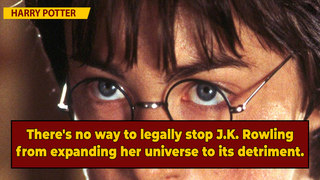'Harry Potter' Needs To Stop Making Plot-Hole Explanations So Complicated

The Harry Potter franchise has a history of inventing convoluted solutions to very simple problems. Like when they invented an entire Fantastic Beast whose venom erases only bad memories, creating infinite complications (Does it erase all bad memories? Didn't that severely impair the lives of more traumatized New Yorkers? Does the magical rebuilding of New York City count as a bad memory?), so they could explain why it "didn't work" on Jacob Kowalski in the sequel because he "didn't have any bad memories."
Nevermind that his memory has clearly been erased at the end of the first installment of the Fantastic Beasts series, and it's long been established that memory charms are reversible, which is why Hermione still has parents.
They similarly explained Harry's inability to see thestrals, those goth horses who transport students from the Hogwarts Express to the castle proper, which are only visible to people who have seen death ...

... until after Cedric's murder in Goblet of Fire even though he'd been present at his mother's death as an infant. Apparently, it's also contingent on the "emotional understanding of what death means," which Harry was too young to have at the time. Conveniently, Luna Lovegood could explain to Harry what thestrals were even though she was also very young when her mother died "because she is intuitive, spiritual, and unafraid of the afterlife."
But there's a much simpler explanation. The books and movies only said that one has to "see" death for thestrals to be visible. And you know what baby Harry Potter didn't have? Glasses. His vision is bad enough that he only sees "fuzzy outlines" of people, even if they're standing very close by, so he literally didn't see his mother's death.
Far be it from J.K. Rowling to remember anything she's ever written, though, so instead, we get some bullshit about the understanding of death, which can't be remotely quantified. Do you have to see another death after you've completed the process of understanding it? By age 11, Harry had spent his whole life being reminded daily of his parents' eternal absence and even started spending all his spare time with a mirror that let him see them. That's one death-understanding preteen. What if you're still kind of, sort of coming to terms with it? Do you get wispy, ephemeral eques-skeletons? What if you've lost many loved ones, but you weren't actually there when they went?
None of these questions should be necessary, but it turns out there's no way to legally stop J.K. Rowling from expanding her universe to its detriment. We've looked into it.
Top image: Warner Bros.